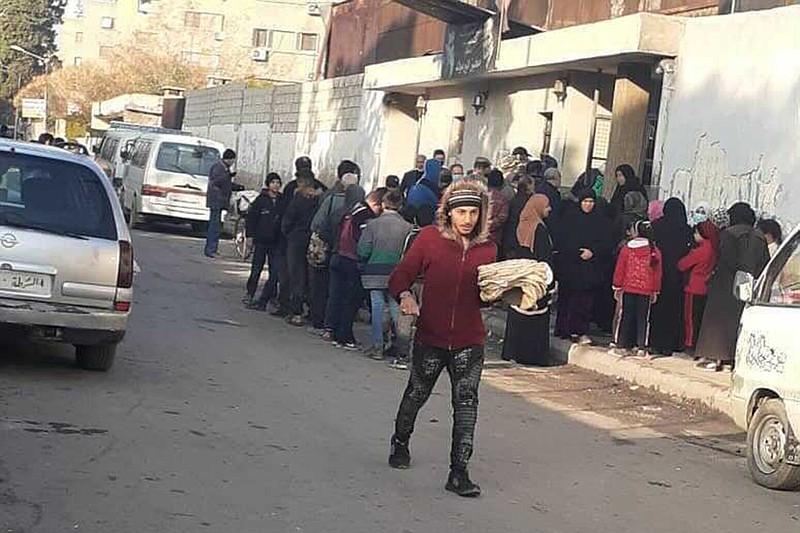BEIRUT -- Every morning, Abu Mohammed and his two eldest sons wake up for dawn prayer in Damascus, then take turns heading to the bakery.
They wait for at least three hours, barely making it to work or school on time, he said. Often, the boys miss their first few classes. Sometimes they miss the whole day.
"One day I stood for seven hours," he said in a phone interview. "The next day it was eight, then six. I saw that my work was being hit. I need to work. I need to live."
Abu Mohammed, who declined to give his full name for fear of harassment by the security services, is among a rapidly growing number of Syrians languishing in seemingly endless lines.
The bread crisis is perhaps the most visible and painful manifestation of Syria's economic meltdown. It has seen the amount of subsidized bread most families can buy reduced by half or even more.
[CORONAVIRUS: Click here for our complete coverage » arkansasonline.com/coronavirus]Subsidized prices have doubled since October, despite official promises in the spring that price increases for bread were a "red line" that would not be crossed.
Abu Mohammed, a factory worker and father of five, said he needs three to four bags of bread a day. He buys two bags of coarse, low-quality bread from a government bakery, his full allotment under the subsidized system. He waits in line at private bakeries for other, higher-quality loaves. When desperate -- and when he can find them -- he pays 10 times the official price of about 50 cents to buy more low-quality loaves from what he calls "the crisis dealers" on the black market.
Outside major cities, the deprivation may be even worse.
"The poor man living in the village no longer has gas; he has wood. He's out of bread; he makes his own," said a resident of the coastal city Tartous, interviewed over Facebook.
Syrians eat bread with nearly every meal in Syria. Torn chunks are pinched into mini-pockets, held between two fingers to scoop up strained yogurt and olives for breakfast. It hugs stuffed vegetables for lunch and is wrapped into late-night shawarma orders.
Traditionally, it's much larger, fluffier and thinner than pita found in the United States and is sold in stacks of about seven in transparent plastic bags.
Recently, Syrians began to gripe that fewer pieces are in each bag.
In an interview with the pro-government Al-Watan newspaper this month, Agriculture Minister Hassan Qatna sought to deflect public discontent, saying, "Let's go back to baking bread in our houses and instead of waiting on the government."
But as prices have doubled, quality has deteriorated and lines have grown ridiculously long, citizens who would not have dared to complain before, fearing the autocratic government of President Bashar al-Assad, are venting their ire. This anger spiked after the newspaper of the ruling Baath Party reported this month that 500 tons of wheat disappeared while being unloaded from a ship.
During the past three years, Syria has imported an annual average of more than 1.1 million tons of wheat, according to the Syria Report, which monitors the country's economy.
Nearly all the imports were from Russia, a vital Assad ally, but the spread of the coronavirus pushed Russia to limit wheat exports to protect its domestic supply.
An official at the Syrian Grain Establishment said this month that Russian companies have withdrawn from six contracts with Syria, cutting total wheat imports nearly in half.
At the same time, the deepening economic crisis -- resulting from war, mismanagement, U.S. sanctions and the spillover effect of a financial meltdown in neighboring Lebanon -- has gutted the value of the Syrian pound, making it prohibitively expensive to import wheat. The crisis has also disrupted the production and marketing of the crop.
Wheat is historically the country's largest crop, but Syria's self-sufficiency, a decades-old cornerstone of the Baath Party's policies, was already being undermined by war and drought.
